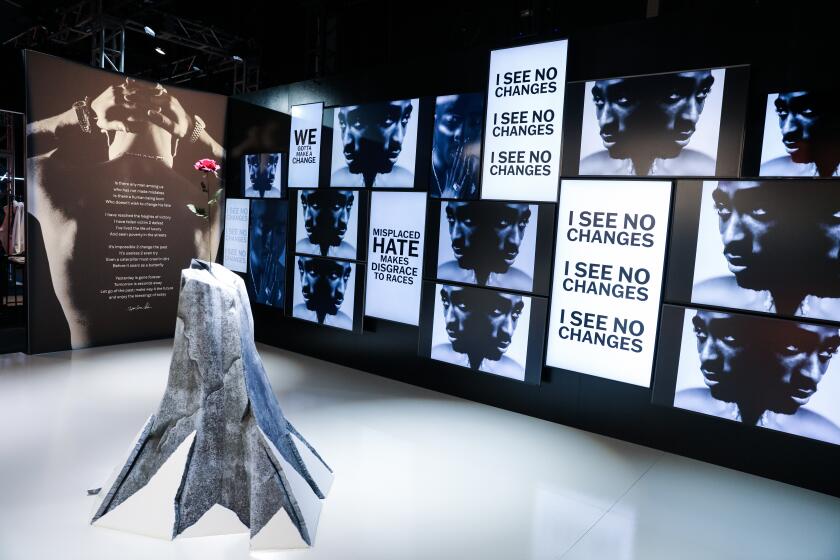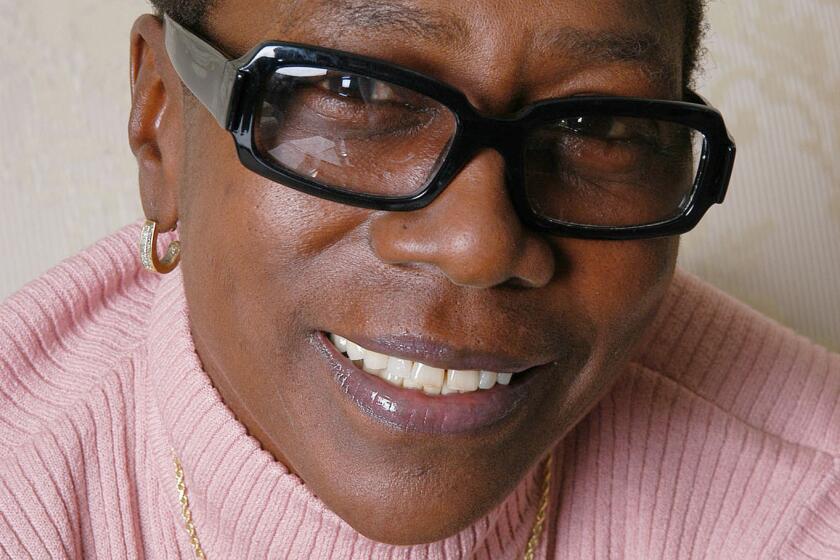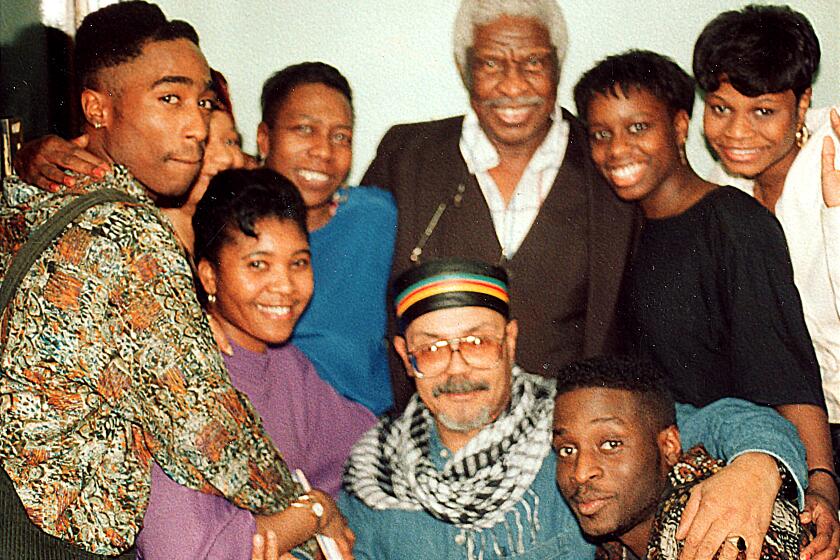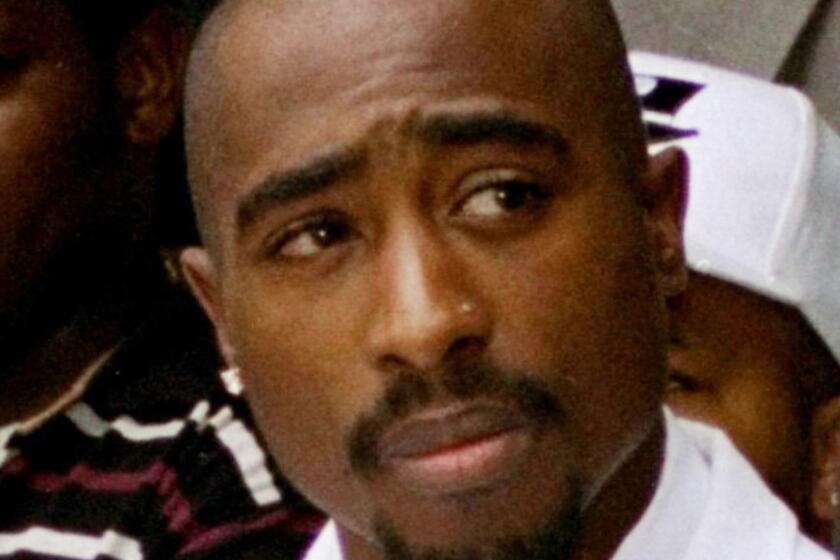Tupac Shakur gets his star on the Hollywood Walk of Fame nearly 3 decades after his death
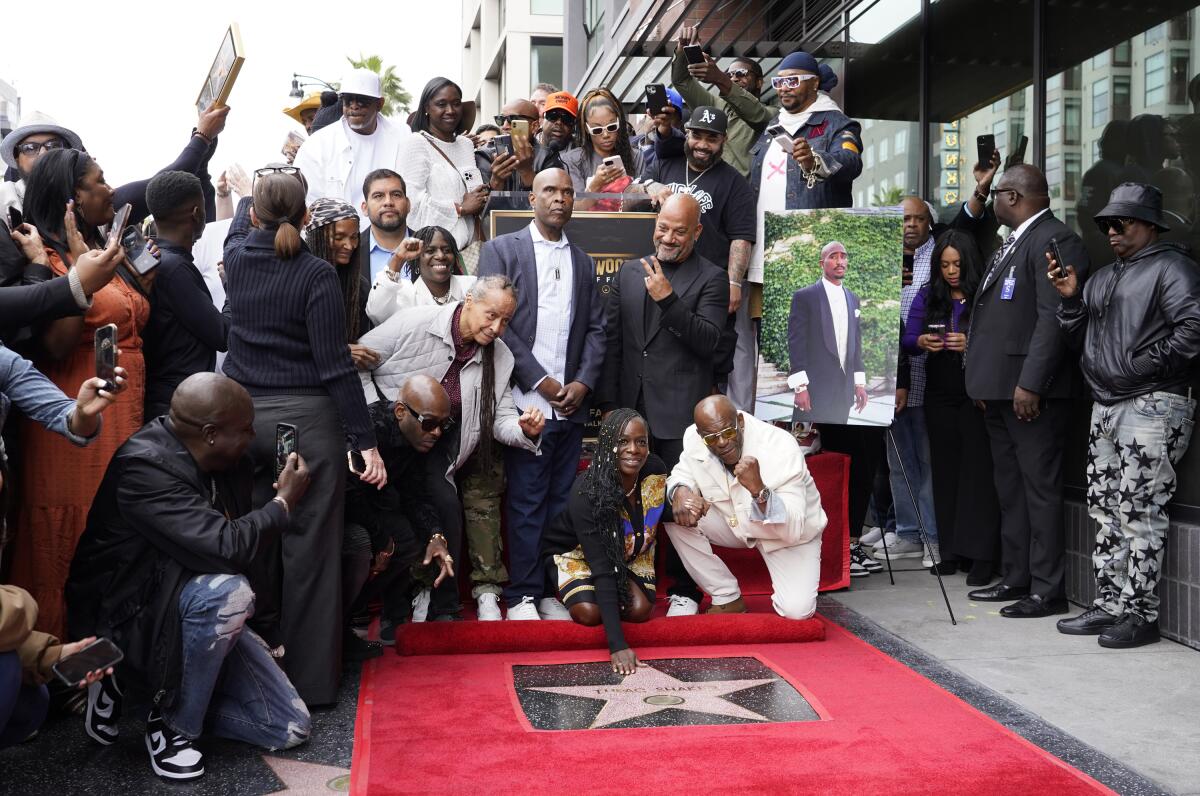
Tupac Shakur, dressed in a suit, stared somberly from a blown-up photo that was erected on an easel like at a memorial service. But the mood along a Hollywood city block on Wednesday pulsed more as a party.
Family members, close friends and other rappers and collaborators hugged, laughed and exchanged memories atop a red carpet along a roadway closed off to traffic.
Pressing against steel barricades, a crowd of hundreds rapped his songs and chanted his name: “Tupac, Tupac, Tupac.” Street vendors hauled boxes from their vans filled with T-shirts bearing Shakur’s face.
Nearly 30 years after the 25-year-old’s death in 1996, the New York-born rapper, actor and activist — whose fame and influence only increased after his death — got his overdue Hollywood send-off: a star on the Walk of Fame.
‘Wake Me When I’m Free’ celebrates the life and art of Tupac Shakur. But Tupac’s sister is suing the trustee of Shakur’s estate over what’s inside.
“I’m feeling an over-elevated high, and I don’t even get high,” Shakur’s cousin Jamala Lesane told The Times after the ceremony, letting out an infectious cackle. “It’s just memories, the energy of all of this here, it’s just a great feeling.”
Nearby stood Shakur’s sister, Sekyiwa “Set” Shakur, who spoke and accepted the star on behalf of the artist. She remembered watching her brother when he was a teen performing at the Apollo Theater in Harlem, where he had a role in a local production of Lorraine Hansberry’s play “A Raisin in the Sun.”
“Before anyone recognized his name,” Sekyiwa Shakur said during her speech, “he knew he had the dream to have his star up there on the Walk of Fame.”
While presenting Sekyiwa with the City Council resolution that declares June 7 Tupac Shakur Day, council member and Watts native Hugo Soto-Martinez spoke enthusiastically about his love for Shakur, saying the rapper’s music “literally kept me alive where I grew up — he was there in my darkest moments.”
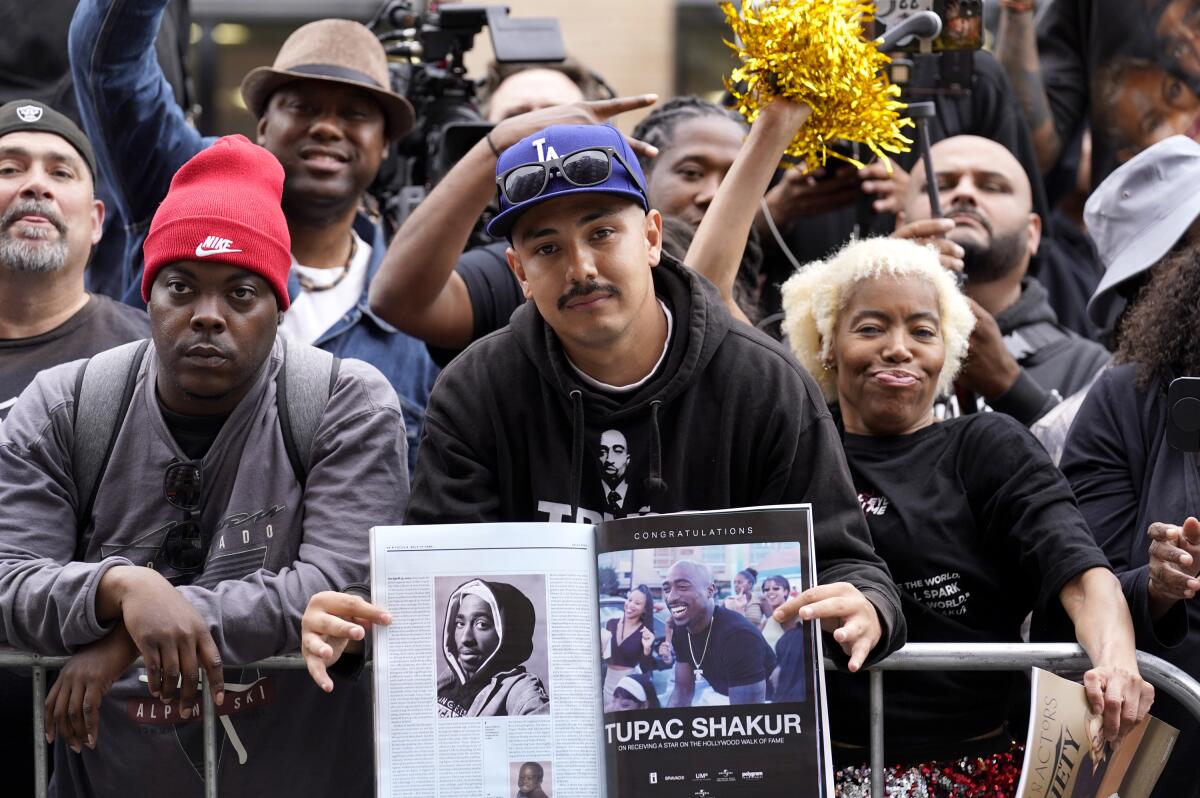
Although Shakur moved frequently during his childhood, from Harlem to Baltimore, eventually landing in Marin County, Calif., it was Los Angeles where he put down roots as a recording artist. His music, which pulses with urgent political messages and tragic scenes of life in the low-income Black and brown neighborhoods of his youth and in Los Angeles, was rooted in West Coast hip-hop but exploded beyond the city. He sold more than 75 million records worldwide, with albums that went platinum and diamond. Artists in later generations, such as Eminem and Kendrick Lamar, have cited Shakur as a direct inspiration.
The phenomenon that was Shakur’s success was something film director Allen Hughes tried to convey with his recent Hulu documentary “Dear Mama,” which delves into the life of Shakur and his mother, onetime Black Panther Party member Afeni Shakur.
As Hughes noticed that murals of Shakur covered the walls of cities across continents, he realized the rapper had become “a global symbol of rebellion ... as visible and important as Malcolm X and Che Guevara.”
Afeni Shakur, who was arrested as one of the Panther 21 and whose views influenced her son, will be the subject of a film.
“That means he’s the people’s champ, and they feel his struggle and his message,” Hughes told The Times after the star ceremony. “It means the world when you see this,” he continued, pointing at Shakur’s star, “‘cause that lives on forever.”
Hughes was a frequent collaborator with Shakur, directing some of his music videos, such as “Brenda’s Got a Baby,” alongside his brother Albert Hughes. A disagreement in 1993 led to Shakur and a group of others assaulting Hughes, leaving him with injuries. The rapper eventually apologized for the incident. With the backing of the Shakur estate, Hughes directed “Dear Mama,” which delved into moments such as those that complicated Shakur’s legacy.
“I feel like the cinema, the film of it, has never met him where he’s at,” Hughes said of Shakur’s stature and films and shows about him. “So that was my goal with [the series], is my goal eternally.”
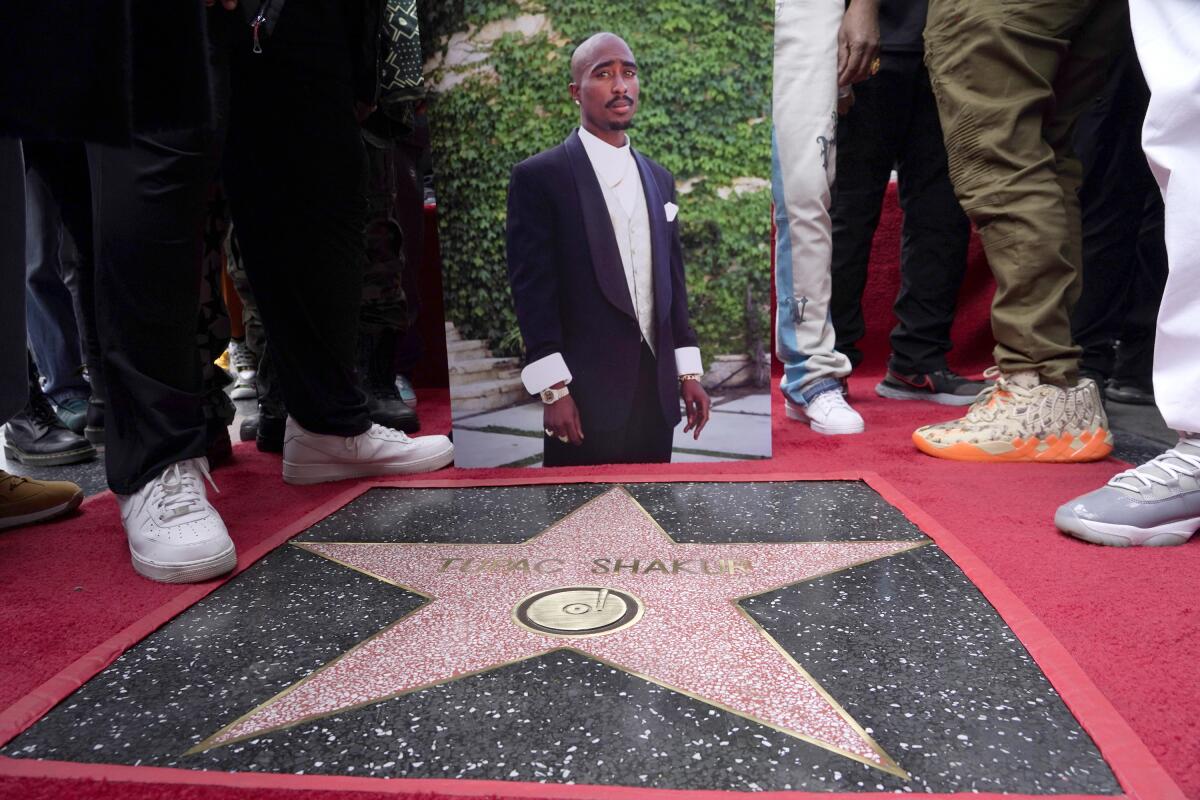
The series was told from the perspective of Shakur’s family, close friends and collaborators, primarily his mother, who died in May 2016. Hughes used archived recordings she made after her son’s death in which she told the story of her life and her son’s life. The director drew parallels between her struggles with the criminal justice system and the FBI’s COINTELPRO program, and her son’s legal battles.
He shone a light on Shakur’s shooting of two off-duty police officers involved in a dispute with a Black motorist, and his sexual abuse conviction in New York. Other subjects in the film included Lesane and Jamal Joseph. Joseph was Shakur’s godfather and a former Black Panther Party member who, along with Afeni Shakur, was among the “Panther 21” arrested by the FBI in the 1970s.
The Hollywood Chamber of Commerce had voted in 2014 to honor Shakur with a star, but his mother, who controlled his estate, turned down the recognition. Now, Shakur’s star ceremony comes amid the release of “Dear Mama,” and a year after the opening of a traveling exhibit, “Wake Me When I’m Free,” which was featured at L.A. Live. However, beneath the surface of these events celebrating Shakur, there remains ongoing tension within the Shakur estate.
Shakur’s sister, Sekyiwa Shakur, filed a lawsuit against the trustee of Afeni Shakur’s estate, music executive Tom Whalley, in early 2022. In the suit, Sekyiwa accuses Whalley of embezzling millions of dollars while hoarding items that belonged to the rapper that she believes are now hers.
Santi Elijah Holley’s ‘An Amerikan Family: The Shakurs and the Nation They Created’ tells the full story of the radical Black family that bred late rapper Tupac Shakur.
Those engaged in the suit had seemingly set aside the legal dispute for Wednesday’s celebration. During the unveiling of Shakur’s star — a photo-op moment during which only a few designated guests are usually present — family and friends defied decorum, crowding the platform, overshadowing Chamber of Commerce and public officials, as the group excitedly huddled to catch a glimpse of the pink terrazzo tile.
Attendees included Compton rapper YG, actor and comedian Mike Epps and several of Shakur’s collaborators, including his fellow Digital Underground rapper Money-B and producer DJ Quik, who produced songs with the slain emcee and helped popularize West Coast hip-hop. Members of the Outlawz, Shakur’s group at Death Row Records, including E.D.I. Mean and Shakur’s step brother, Mopreme Shakur, were also among the attendees. Longtime hip-hop radio host Big Boy emceed the ceremony.
Joseph, Shakur’s godfather, was also among the speakers and guests at Wednesday’s ceremony.
After he and his wife landed at LAX a day earlier, Joseph said, the driver sent to pick up them up had coincidentally been bumping Shakur’s 1995 song “Dear Mama” from his car’s speakers. The driver, who immigrated from Georgia (“Not the ATL Georgia,” Joseph clarified), shared how he and his friends grew up listening to the rapper.
Tupac Shakur will finally be honored with a star on the Hollywood Walk of Fame, more than 20 years after he was killed in 1996.
“When you think about that global influence, when you think about that star shining, you think of Tupac Amaru Shakur,” said Joseph, who is now a writer, poet and director who teaches at Columbia University, during his speech at Wednesday’s ceremony. “I think that, today, he would want us to celebrate the message, not just the man. And he would want us to continue on the charge that he left us with — and that was to always ascend, to be that rose that pushes through concrete, no matter where you are.”
Earlier in his speech, Joseph asked the audience to raise their hands “if you love Tupac,” and then called on them to “put your hands over your heart if that phrase, ‘A rose that grew from the concrete,’ applies to you, your life and your dreams.”
Both the attendees seated on the red carpet and the crowd of fans outside the barricades, some of them scrambling atop a plastic road barrier to catch a view, stood in a rare moment of silence amid the raucous ceremony, with their hands raised or resting against their chests.
“That’s the impact he had,” Joseph said.
Times staff writer Kenan Draughorne contributed to this report.
More to Read
The biggest entertainment stories
Get our big stories about Hollywood, film, television, music, arts, culture and more right in your inbox as soon as they publish.
You may occasionally receive promotional content from the Los Angeles Times.
